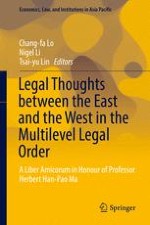2016 | OriginalPaper | Chapter
9. Different Patterns of Applying Transitional Constitutionalism Between the Nationalists and the Communists
Author : David K. C. Huang
Published in: Legal Thoughts between the East and the West in the Multilevel Legal Order
Publisher: Springer Singapore
Activate our intelligent search to find suitable subject content or patents.
Select sections of text to find matching patents with Artificial Intelligence. powered by
Select sections of text to find additional relevant content using AI-assisted search. powered by
